Reflective Journal 1: Emotional Intelligence and Professional Practice
VerifiedAdded on 2023/01/10
|6
|1074
|73
Journal and Reflective Writing
AI Summary
This reflective journal explores the author's emotional intelligence (EI) based on a self-assessment. The journal begins with an introduction to EI, defining it as the ability to manage and understand one's own emotions and those of others. The main body of the journal analyzes the assessment results across four areas: self-awareness, self-management, social awareness, and relationship management. The author agrees with the results, highlighting strengths in social awareness and relationship management, while identifying areas for improvement in self-awareness and self-management. The author reflects on the insights gained and discusses how these insights can be used to improve professional practice. The author emphasizes the importance of developing self-awareness and self-management skills to enhance professional effectiveness. The journal concludes by summarizing the importance of EI and its impact on professional life. The journal also includes a list of references from academic journals and books related to emotional intelligence.
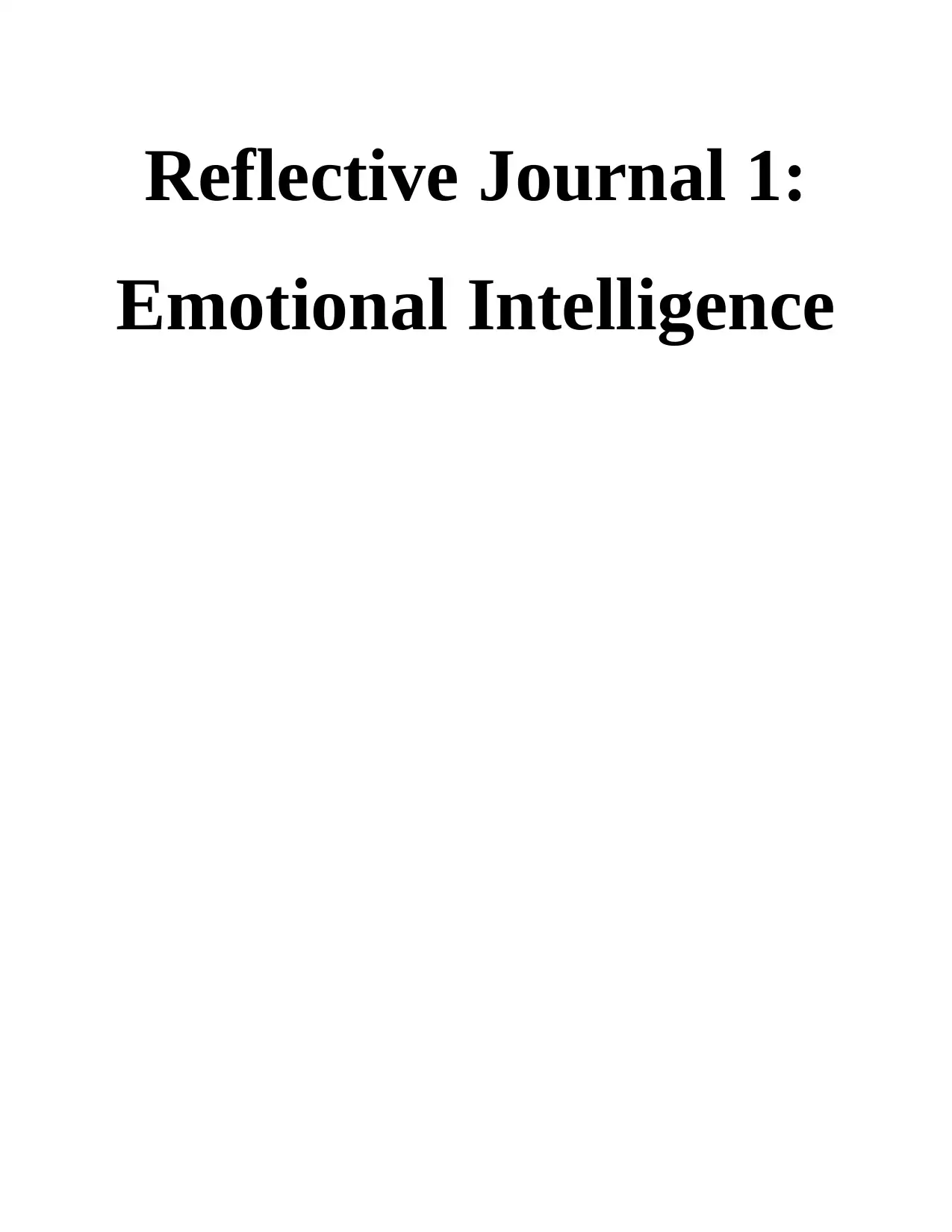
Reflective Journal 1:
Emotional Intelligence
Emotional Intelligence
Paraphrase This Document
Need a fresh take? Get an instant paraphrase of this document with our AI Paraphraser
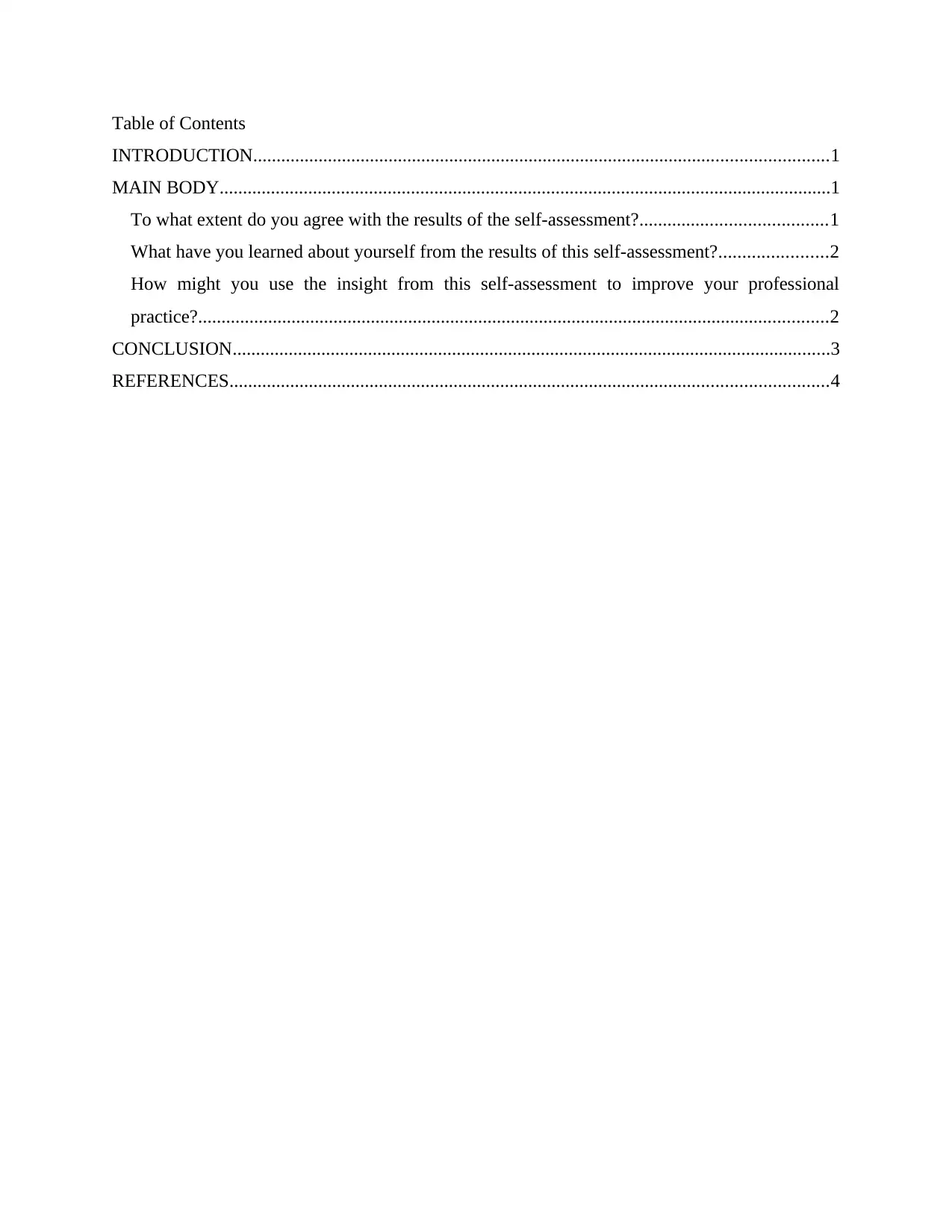
Table of Contents
INTRODUCTION...........................................................................................................................1
MAIN BODY...................................................................................................................................1
To what extent do you agree with the results of the self-assessment?........................................1
What have you learned about yourself from the results of this self-assessment?.......................2
How might you use the insight from this self-assessment to improve your professional
practice?.......................................................................................................................................2
CONCLUSION................................................................................................................................3
REFERENCES................................................................................................................................4
INTRODUCTION...........................................................................................................................1
MAIN BODY...................................................................................................................................1
To what extent do you agree with the results of the self-assessment?........................................1
What have you learned about yourself from the results of this self-assessment?.......................2
How might you use the insight from this self-assessment to improve your professional
practice?.......................................................................................................................................2
CONCLUSION................................................................................................................................3
REFERENCES................................................................................................................................4
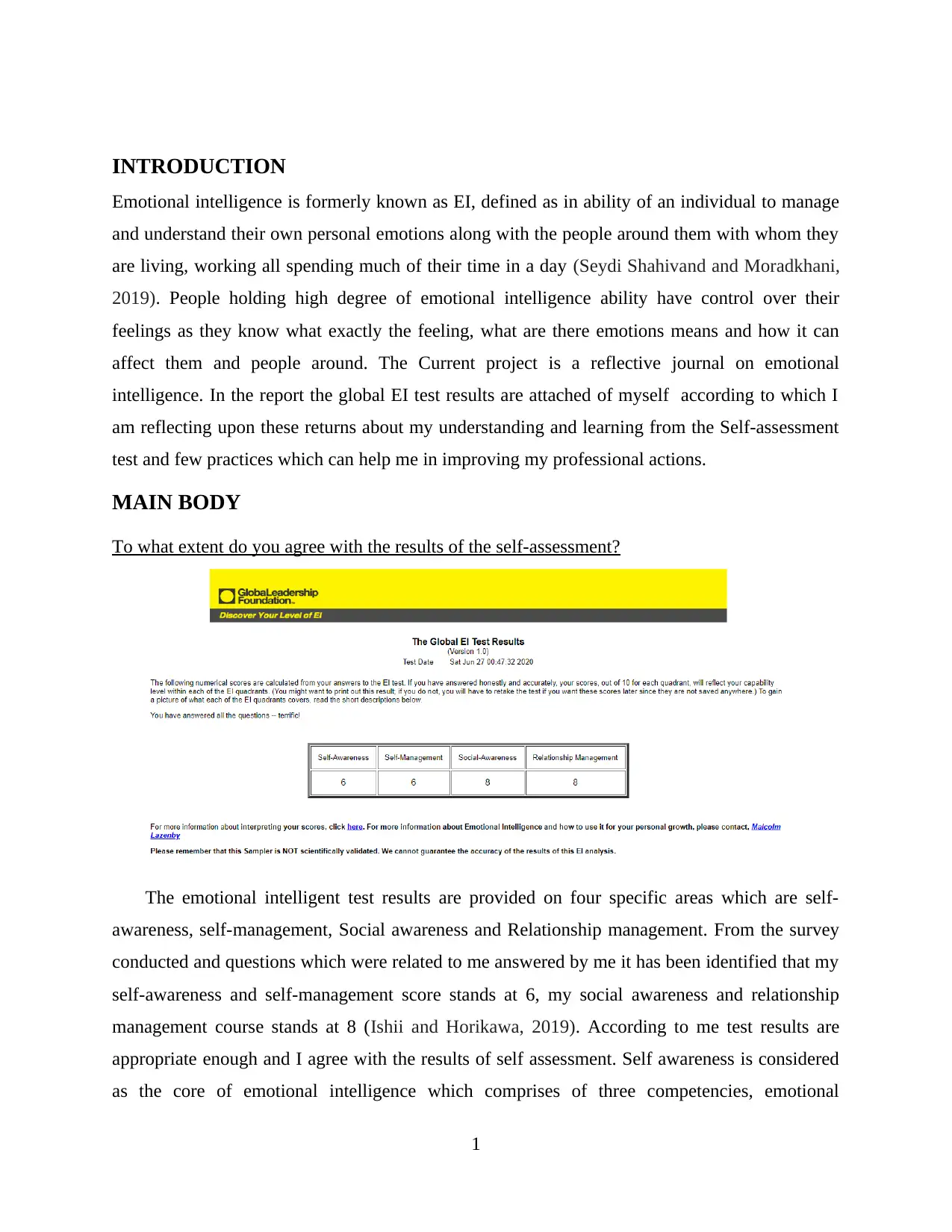
INTRODUCTION
Emotional intelligence is formerly known as EI, defined as in ability of an individual to manage
and understand their own personal emotions along with the people around them with whom they
are living, working all spending much of their time in a day (Seydi Shahivand and Moradkhani,
2019). People holding high degree of emotional intelligence ability have control over their
feelings as they know what exactly the feeling, what are there emotions means and how it can
affect them and people around. The Current project is a reflective journal on emotional
intelligence. In the report the global EI test results are attached of myself according to which I
am reflecting upon these returns about my understanding and learning from the Self-assessment
test and few practices which can help me in improving my professional actions.
MAIN BODY
To what extent do you agree with the results of the self-assessment?
The emotional intelligent test results are provided on four specific areas which are self-
awareness, self-management, Social awareness and Relationship management. From the survey
conducted and questions which were related to me answered by me it has been identified that my
self-awareness and self-management score stands at 6, my social awareness and relationship
management course stands at 8 (Ishii and Horikawa, 2019). According to me test results are
appropriate enough and I agree with the results of self assessment. Self awareness is considered
as the core of emotional intelligence which comprises of three competencies, emotional
1
Emotional intelligence is formerly known as EI, defined as in ability of an individual to manage
and understand their own personal emotions along with the people around them with whom they
are living, working all spending much of their time in a day (Seydi Shahivand and Moradkhani,
2019). People holding high degree of emotional intelligence ability have control over their
feelings as they know what exactly the feeling, what are there emotions means and how it can
affect them and people around. The Current project is a reflective journal on emotional
intelligence. In the report the global EI test results are attached of myself according to which I
am reflecting upon these returns about my understanding and learning from the Self-assessment
test and few practices which can help me in improving my professional actions.
MAIN BODY
To what extent do you agree with the results of the self-assessment?
The emotional intelligent test results are provided on four specific areas which are self-
awareness, self-management, Social awareness and Relationship management. From the survey
conducted and questions which were related to me answered by me it has been identified that my
self-awareness and self-management score stands at 6, my social awareness and relationship
management course stands at 8 (Ishii and Horikawa, 2019). According to me test results are
appropriate enough and I agree with the results of self assessment. Self awareness is considered
as the core of emotional intelligence which comprises of three competencies, emotional
1
⊘ This is a preview!⊘
Do you want full access?
Subscribe today to unlock all pages.

Trusted by 1+ million students worldwide
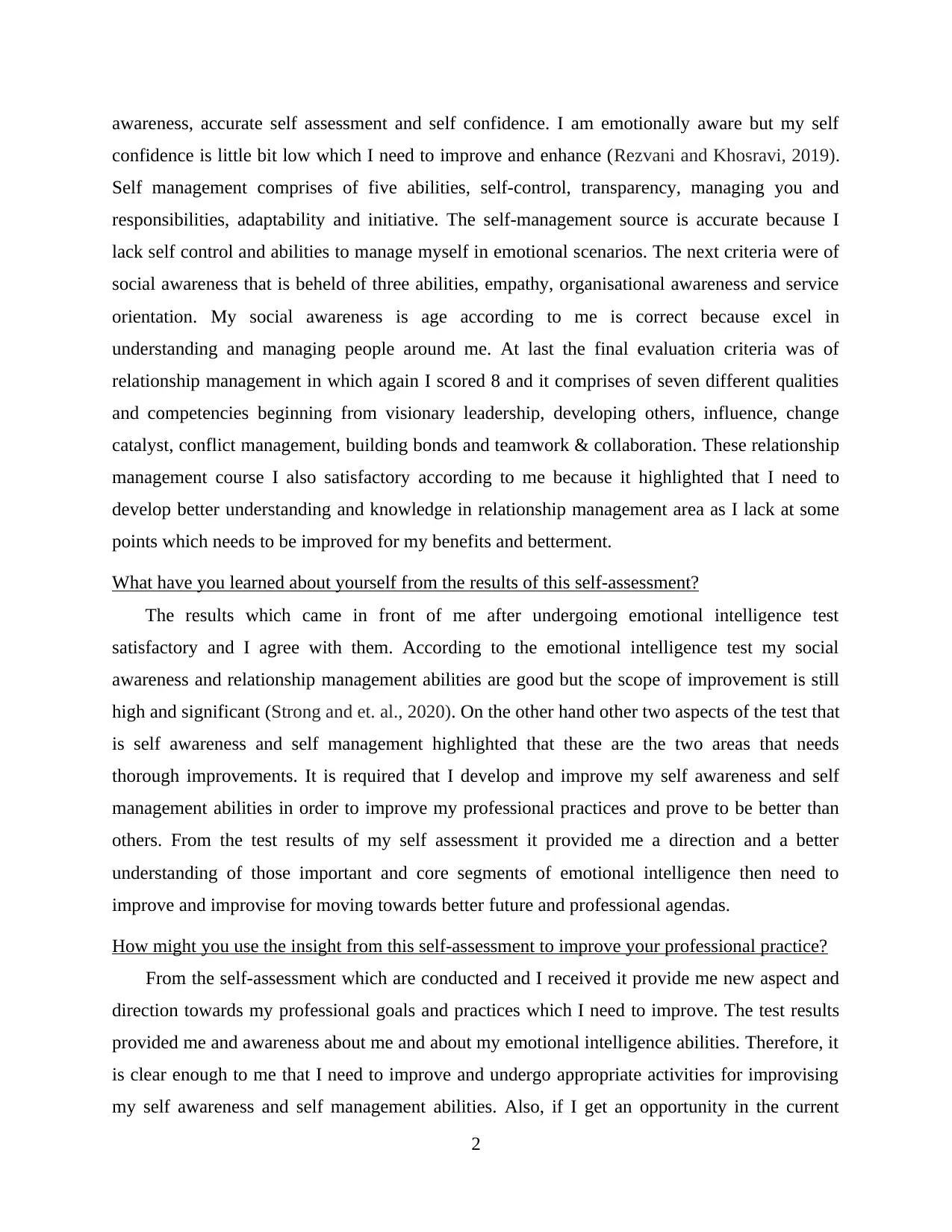
awareness, accurate self assessment and self confidence. I am emotionally aware but my self
confidence is little bit low which I need to improve and enhance (Rezvani and Khosravi, 2019).
Self management comprises of five abilities, self-control, transparency, managing you and
responsibilities, adaptability and initiative. The self-management source is accurate because I
lack self control and abilities to manage myself in emotional scenarios. The next criteria were of
social awareness that is beheld of three abilities, empathy, organisational awareness and service
orientation. My social awareness is age according to me is correct because excel in
understanding and managing people around me. At last the final evaluation criteria was of
relationship management in which again I scored 8 and it comprises of seven different qualities
and competencies beginning from visionary leadership, developing others, influence, change
catalyst, conflict management, building bonds and teamwork & collaboration. These relationship
management course I also satisfactory according to me because it highlighted that I need to
develop better understanding and knowledge in relationship management area as I lack at some
points which needs to be improved for my benefits and betterment.
What have you learned about yourself from the results of this self-assessment?
The results which came in front of me after undergoing emotional intelligence test
satisfactory and I agree with them. According to the emotional intelligence test my social
awareness and relationship management abilities are good but the scope of improvement is still
high and significant (Strong and et. al., 2020). On the other hand other two aspects of the test that
is self awareness and self management highlighted that these are the two areas that needs
thorough improvements. It is required that I develop and improve my self awareness and self
management abilities in order to improve my professional practices and prove to be better than
others. From the test results of my self assessment it provided me a direction and a better
understanding of those important and core segments of emotional intelligence then need to
improve and improvise for moving towards better future and professional agendas.
How might you use the insight from this self-assessment to improve your professional practice?
From the self-assessment which are conducted and I received it provide me new aspect and
direction towards my professional goals and practices which I need to improve. The test results
provided me and awareness about me and about my emotional intelligence abilities. Therefore, it
is clear enough to me that I need to improve and undergo appropriate activities for improvising
my self awareness and self management abilities. Also, if I get an opportunity in the current
2
confidence is little bit low which I need to improve and enhance (Rezvani and Khosravi, 2019).
Self management comprises of five abilities, self-control, transparency, managing you and
responsibilities, adaptability and initiative. The self-management source is accurate because I
lack self control and abilities to manage myself in emotional scenarios. The next criteria were of
social awareness that is beheld of three abilities, empathy, organisational awareness and service
orientation. My social awareness is age according to me is correct because excel in
understanding and managing people around me. At last the final evaluation criteria was of
relationship management in which again I scored 8 and it comprises of seven different qualities
and competencies beginning from visionary leadership, developing others, influence, change
catalyst, conflict management, building bonds and teamwork & collaboration. These relationship
management course I also satisfactory according to me because it highlighted that I need to
develop better understanding and knowledge in relationship management area as I lack at some
points which needs to be improved for my benefits and betterment.
What have you learned about yourself from the results of this self-assessment?
The results which came in front of me after undergoing emotional intelligence test
satisfactory and I agree with them. According to the emotional intelligence test my social
awareness and relationship management abilities are good but the scope of improvement is still
high and significant (Strong and et. al., 2020). On the other hand other two aspects of the test that
is self awareness and self management highlighted that these are the two areas that needs
thorough improvements. It is required that I develop and improve my self awareness and self
management abilities in order to improve my professional practices and prove to be better than
others. From the test results of my self assessment it provided me a direction and a better
understanding of those important and core segments of emotional intelligence then need to
improve and improvise for moving towards better future and professional agendas.
How might you use the insight from this self-assessment to improve your professional practice?
From the self-assessment which are conducted and I received it provide me new aspect and
direction towards my professional goals and practices which I need to improve. The test results
provided me and awareness about me and about my emotional intelligence abilities. Therefore, it
is clear enough to me that I need to improve and undergo appropriate activities for improvising
my self awareness and self management abilities. Also, if I get an opportunity in the current
2
Paraphrase This Document
Need a fresh take? Get an instant paraphrase of this document with our AI Paraphraser
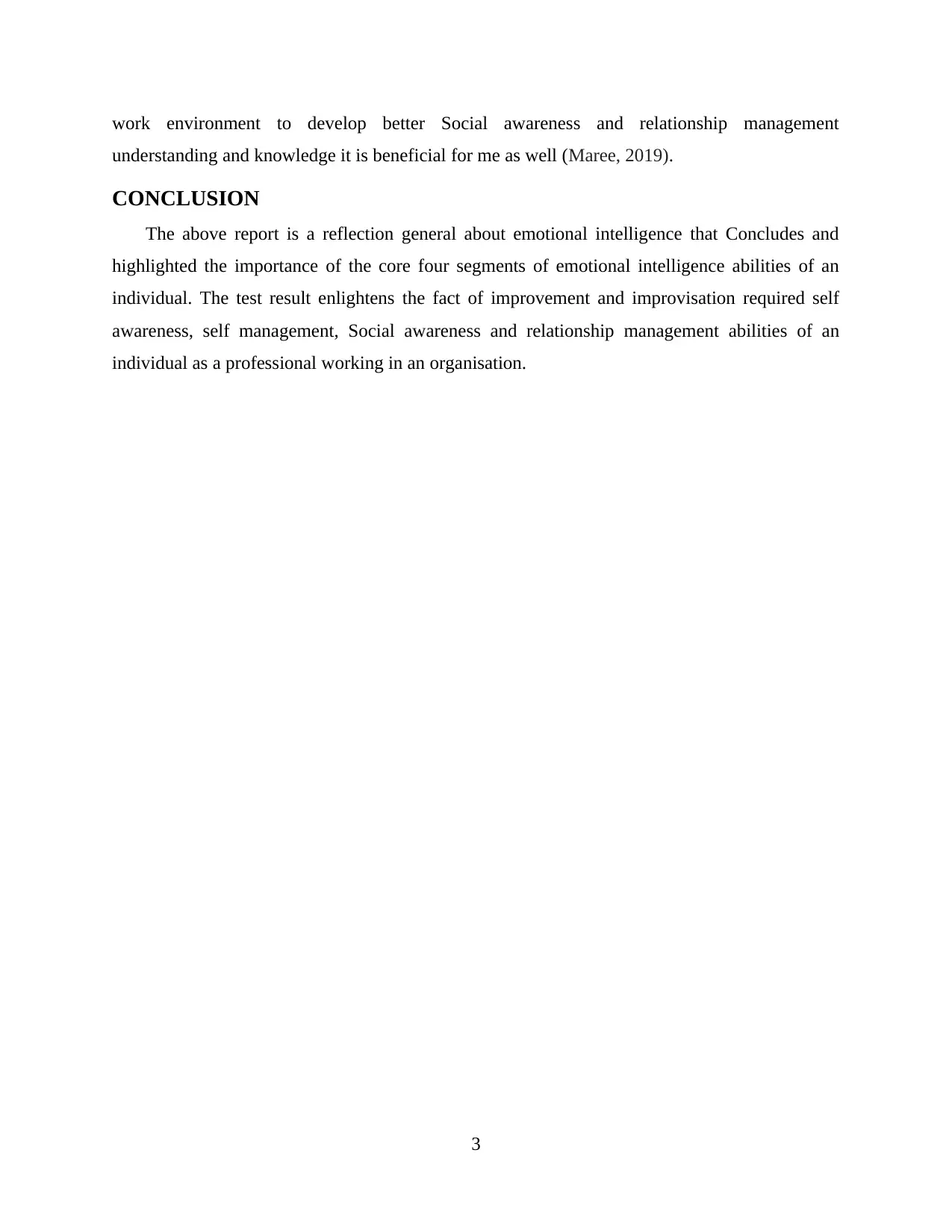
work environment to develop better Social awareness and relationship management
understanding and knowledge it is beneficial for me as well (Maree, 2019).
CONCLUSION
The above report is a reflection general about emotional intelligence that Concludes and
highlighted the importance of the core four segments of emotional intelligence abilities of an
individual. The test result enlightens the fact of improvement and improvisation required self
awareness, self management, Social awareness and relationship management abilities of an
individual as a professional working in an organisation.
3
understanding and knowledge it is beneficial for me as well (Maree, 2019).
CONCLUSION
The above report is a reflection general about emotional intelligence that Concludes and
highlighted the importance of the core four segments of emotional intelligence abilities of an
individual. The test result enlightens the fact of improvement and improvisation required self
awareness, self management, Social awareness and relationship management abilities of an
individual as a professional working in an organisation.
3
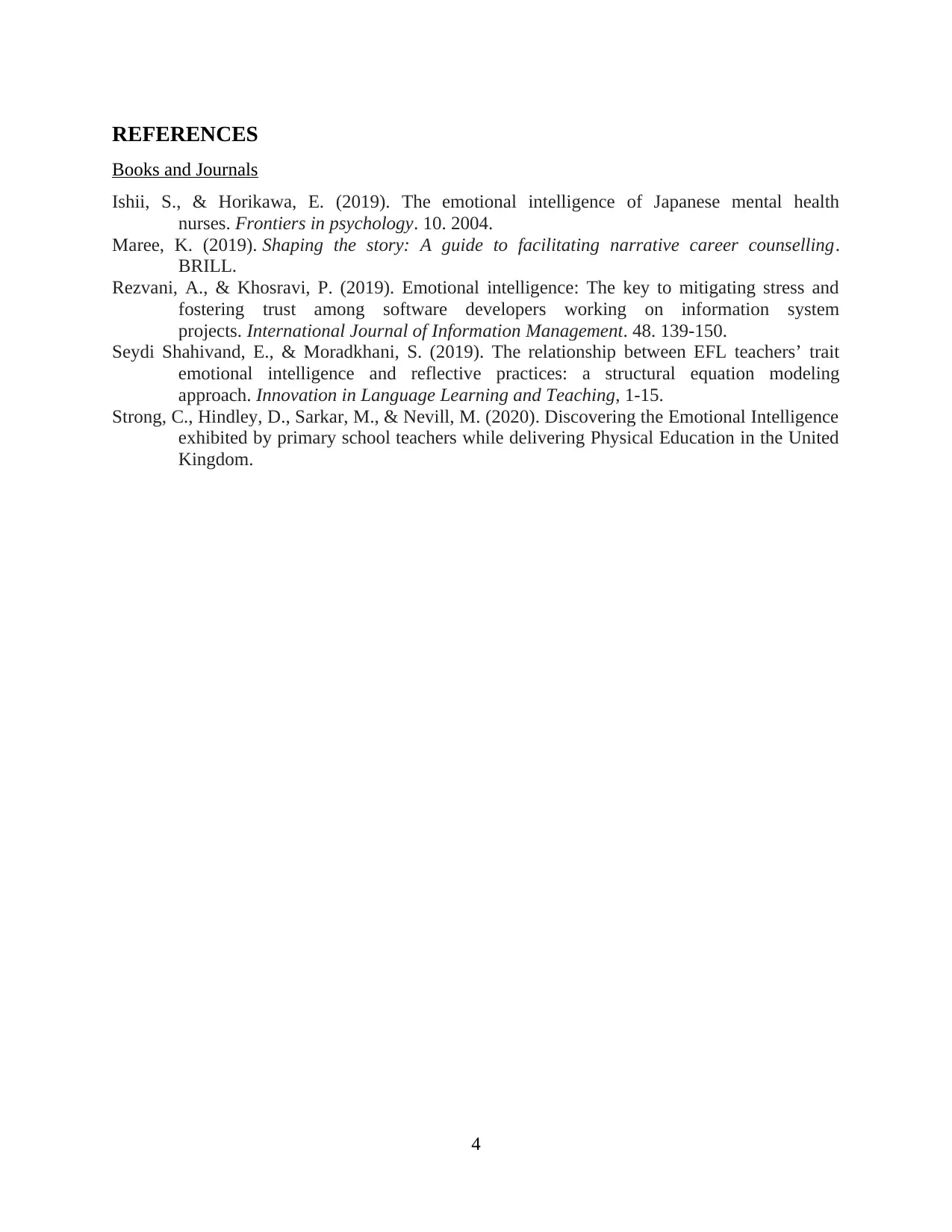
REFERENCES
Books and Journals
Ishii, S., & Horikawa, E. (2019). The emotional intelligence of Japanese mental health
nurses. Frontiers in psychology. 10. 2004.
Maree, K. (2019). Shaping the story: A guide to facilitating narrative career counselling.
BRILL.
Rezvani, A., & Khosravi, P. (2019). Emotional intelligence: The key to mitigating stress and
fostering trust among software developers working on information system
projects. International Journal of Information Management. 48. 139-150.
Seydi Shahivand, E., & Moradkhani, S. (2019). The relationship between EFL teachers’ trait
emotional intelligence and reflective practices: a structural equation modeling
approach. Innovation in Language Learning and Teaching, 1-15.
Strong, C., Hindley, D., Sarkar, M., & Nevill, M. (2020). Discovering the Emotional Intelligence
exhibited by primary school teachers while delivering Physical Education in the United
Kingdom.
4
Books and Journals
Ishii, S., & Horikawa, E. (2019). The emotional intelligence of Japanese mental health
nurses. Frontiers in psychology. 10. 2004.
Maree, K. (2019). Shaping the story: A guide to facilitating narrative career counselling.
BRILL.
Rezvani, A., & Khosravi, P. (2019). Emotional intelligence: The key to mitigating stress and
fostering trust among software developers working on information system
projects. International Journal of Information Management. 48. 139-150.
Seydi Shahivand, E., & Moradkhani, S. (2019). The relationship between EFL teachers’ trait
emotional intelligence and reflective practices: a structural equation modeling
approach. Innovation in Language Learning and Teaching, 1-15.
Strong, C., Hindley, D., Sarkar, M., & Nevill, M. (2020). Discovering the Emotional Intelligence
exhibited by primary school teachers while delivering Physical Education in the United
Kingdom.
4
⊘ This is a preview!⊘
Do you want full access?
Subscribe today to unlock all pages.

Trusted by 1+ million students worldwide
1 out of 6
Related Documents
Your All-in-One AI-Powered Toolkit for Academic Success.
+13062052269
info@desklib.com
Available 24*7 on WhatsApp / Email
![[object Object]](/_next/static/media/star-bottom.7253800d.svg)
Unlock your academic potential
Copyright © 2020–2026 A2Z Services. All Rights Reserved. Developed and managed by ZUCOL.





